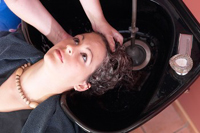|
|

|

PEG Compounds in Cosmetics: A Little-Known Danger to You
by SixWise.com
|
How
many cosmetics and toiletries do you use in a day? Go ahead and add them
all up, from shampoo and body wash to makeup and hair dye. You assume
those products are safe and non-toxic, right?
But
did you know that, according to the government agency that "regulates"
cosmetics, the FDA's Office of Cosmetics and Colors, "... a cosmetic
manufacturer may use almost any raw material as a cosmetic ingredient
and market the product without an approval from FDA."
That's
right. And an Environmental Working Group analysis shows that
"89 percent of 10,500 ingredients used in personal care products
have not been evaluated for safety by the CIR, the FDA, nor any other
publicly accountable institution."
|
 |

Many common cosmetics like
shampoos, mousse, moisturizers,
deodorants and shaving products
contain PEG compounds shown to
have harmful impurities ... but there
are smart alternatives noted below!
|
|
|
That
means that the cosmetics you use daily likely contain ingredients that
have not been studied at all, have been studied inadequately, or worst
of all, have been studied and have been found to cause harm.
Why
You Don't Want Polyethylene Glycol (PEG) in Your Cosmetics
One
such ingredient that is widely used, yet seldom spoken of, is polyethylene
glycol (PEG). PEG-6, PEG-150 and other similar names are all close relatives
of the PEG family.
PEG
compounds are synthetic chemicals used in cosmetics as surfactants, cleansing
agents, emulsifiers, skin conditioners and humectants that many believe
could increase the risk of a variety of cancers, including breast cancer.
They
contain various harmful impurities, according to a report by the Cosmetic
Ingredient Review (CIR) committee that was published in the International
Journal of Toxicology, including:
- Ethylene
oxide: Ethylene oxide increases the incidences of uterine and breast
cancers and of leukemia and brain cancer, according to experimental
results reported by the National Toxicology Program.
- 1,4-dioxane:
According to the National Toxicology Program, "1,4-dioxane is reasonably
anticipated to be a human carcinogen."
- Polycyclic
aromatic compounds (PAHs): Known to increase the risk of breast cancer.
- Lead
- Iron
- Cobalt
- Nickel
- Cadmium
- Arsenic
Unfortunately,
the risks associated with PEG compounds are widely underexposed. Even
the CIR concluded that many PEG compounds "are safe for use"
in cosmetics, yet they added that PEG compounds should "not be used
on damaged skin."
Things
do appear to be moving in the right direction, though, as some 23 PEG
compounds have been named by the CIR Expert Panel as "high priority"
for initiation of safety reviews in 2005.
|
Do
My Cosmetics Contain PEG Compounds?
According
to the Environmental Working Group, the following percentages
of common toiletries contain PEG compounds and other impurities
that are
linked to breast cancer.
|
Mousse
|
|
90.3%
|
|
Hair
Dye
|
|
79.5%
|
|
Baby
Bath Wash
|
|
73.8%
|
|
Douche/Personal
Cleanser
|
|
58.3%
|
|
Menopause
Cream
|
|
54.5% |
|
Depilatory
Cream/Hair Remover
|
|
48.2%
|
|
Baby
Lotion/Oil
|
|
46.4% |
|
Anti-Itch/Rash
Cream
|
|
46.3% |
|
After
Sun Products
|
|
45.5% |
|
Lip
Balm/Treatment
|
|
43.6%
|
|
Moisturizer
|
|
43.1%
|
|
Deodorant
|
|
42.7%
|
|
Facial
Moisturizer/Treatment
|
|
42.0%
|
|
Shaving
Products
|
|
41.3%
|
|
Anti-Aging
Treatment
|
|
41.0%
|
|
Styling
Product
|
|
39.6%
|
|
Eye
Treatment
|
|
38.8%
|
|
Concealer
|
|
37.9%
|
|
Foot
Odor/Cream/Treatment
|
|
37.3%
|
|
Conditioner
|
|
35.2% |
|
|
What's
the Alternative?
It
may seem like an impossible feat to find cosmetics and toiletries that
don't contain PEG or other harmful additives, but if you can move beyond
the major commercial lines of cosmetics sold in grocery store and drug
store chains, they can be found.
The
best alternative is to use natural varieties of cosmetic products
found in health food stores or online.
However,
the risks of PEG compounds, especially in products made for damaged
or sensitive skin, are so widely unknown, that even many products
claiming to be natural contain them. So do some label-scrutinizing
research ...
|
Read
the Label
Your
best bet is to be your own detective and actively seek out -- and
avoid -- any products that contain PEG compounds (and, ideally,
other unknown or questionable chemical additives.)
Organic,
pure cosmetics offer the best chance of being non-toxic, but read
the label -- or ask a trusted representative at a natural health
products store -- nonetheless.
One
natural brand that has gone the extra mile to ensure their products
are free of PEG compounds and other impurities is Aubrey Organics
-- you
can review many of their products right now, including shampoos,
conditioner, skin lotion, hairspray, soap and much more.
|
 |

Brands like Aubrey
Organics have gone
the extra mile to ensure their cosmetic
products
are free of PEG compounds
and other impurities. They offer a full line
of cosmetics including shampoos,
conditions, deodorant, hairspray, and
much more.
See
Aubrey Products Now!
|
|
Also,
SixWise.com highly recommends that you check out the Environmental
Working Group's Skin Deep Report, which includes a searchable directory
of cosmetics and any harmful additives they contain. You can search
by product name and see whether the cosmetics and toiletries you use
daily contain questionable ingredients that could be slowly wreaking
havoc on your health.
|
To get more information about this and other highly important topics, sign up for your free subscription to our weekly SixWise.com "Be Safe, Live Long & Prosper" e-newsletter.
With every issue of the free SixWise.com newsletter, you’ll get access to the insights, products, services, and more that can truly improve your well-being, peace of mind, and therefore your life!
|
|
|
|